Identifying Toxidromes
The offending toxin may not be immediately identifiable, but this does not mean that treatment can be delayed. However, toxins may present with a toxidrome or a typical grouping of signs or symptoms that suggest the offending toxin or its group. This can help guide management quickly. Clinical presentation and history are key to this evaluation as well as a high level of suspicion by the health care provider:
Key Takeaway
High Index of Suspicion is Key for Toxin Exposure
Be aware of a suggestive history or clinical presentation
Evaluate for clinical toxidrome
Immediately provide supportive treatment while performing diagnostic evaluation
Be aware that multiple people may have been exposed to the same toxin
Be aware that multiple exposures may have occurred, complicating presenting symptoms
- Evaluate for typical signs or symptoms that suggest a particular toxin
- Classify signs based on organ systems including vitals, skin or mucus membranes, neurologic, cardiovascular, gastrointestinal/genitourinary.
Toxin management is not one size fits all. Consultation with a toxicologist or poison control center is often prudent if severe exposure. Some therapies that may be beneficial include:
- Increasing dosage of ACLS medications
- Using medications outside of typical ACLS repertoire
- Using individualize antidotes/antagonists
- Excessive therapies including prolonged CPR and circulatory assisting devices
Key Takeaway
Know the number to call
Call the Poison control Center at 1-800-222-1222 if within the US.
If toxin exposure is suspected:
- Determine if the patient requires decontamination and ensure personal protection
- Begin with basic life support (BLS) including initial and secondary assessments as well as supportive measures
- Determine if antidote or supportive therapy is necessary
Patients’ vital and basic functions should be supported, including airway, breathing, and circulation. Obtaining IV access and providing blood pressure support is important. If a specific toxin is likely, identify an antidote if possible, and manage the patient accordingly.

The U.S. Poison Control Center hotline is 1-800-222-1222.

Patients who have ingested the toxin no longer routinely benefit from gastric lavage or ipecac syrup. In the case of significant toxin ingestion with no available antidote, activated charcoal can be given if within 60 minutes from ingestion. Repeated doses may be indicated in those toxins in which the ingestion amount is life-threatening, and benefit has been shown (i.e., dapsone, carbamazepine, theophylline, quinine, and phenobarbital).

Naloxone for Opioid Overdose